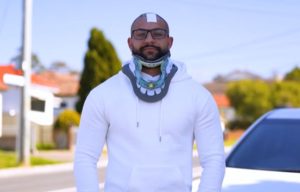The luckiest man alive
A refugee from war-torn Lebanon narrowly escaped death when he was hit by a stray bullet on the streets of Sydney.
Ramadan Osman was collateral damage in Sydney’s gangland war when, as an innocent bystander, he was hit in the head during a gangland killing.
Afterwards he suffered trauma and mental health issues and was forced to give up his dream of becoming a personal trainer.
But he is now healthy and working, thanks to support from refugee settlement and employment agency AMES Australia.
 Ramadan was sitting with his younger brother outside their home one evening in August, 2021, when gunmen opened fire nearby.
Ramadan was sitting with his younger brother outside their home one evening in August, 2021, when gunmen opened fire nearby.
“How I survived, I still cannot comprehend. I was shot in the head, not grazed, but the bullet actually penetrated my skull and exited from the top. It left a scratch on my skull,” Rama said.
“We were sitting down, me and my brother in the car, minding our own business watching the highlights from the footy. I’m just sitting there just chilling and talking and my brother says to me ‘shots’ and I was thinking ‘no’, like I couldn’t believe it,” Ramadan said.
“My brother shouted ‘duck’. I was sitting up and if I hadn’t ducked sit down the bullet would have gone through middle head.
“I had my phone and I chucked it on the floor and went down and by the looks of it the bullet has gone into my forehead and grazed around and come out on the side.
“I put my hand on my head and went face first into the dashboard. I said to my brother ‘I’m shot’ and he said ‘no you’re not’,
“I said ‘bro I’m shot like I don’t know if I’m going to make it, I love you bro’.
“We thought there was going to be more shots so we just literally hid under the seat and then we waited about 10 to 20 seconds and then I just got out and ran inside but by then I was so covered in blood that I ran into the wall,” Ramadan said.
He tied a singlet around his head to stem the bleeding and he was taken to Sydney’s Westmead Hospital.
Staff there were amazed by Ramadan’s good luck.
“They came and reassured me. The doctor said ‘look, you’re one millimetre away from your skull penetrated and you almost died – but you’re still breathing, you’re the luckiest man alive – which I am honestly,” Ramadan said.
“They put eleven stitches in my head and they told me I had copped a severe whiplash.
“The doctor said ‘I have never seen anything like this in 20 years”. He said he had never experienced someone who’d been shot in the head and actually surviving.”
About 300 metres down the road, 22-year-old Shady Kanj was shot and killed in a friend’s car.
Mr Kanj was a known associate of the Alameddine crime family and reports at the time said he and another man were ambushed.
Ramadan was wearing a beanie when he was shot and, incredibly, it caught the bullet.
“So the actual bullet was stuck to my beanie. Like how that happened I don’t know, it’s a miracle,” he said.
Ramadan said he and his brother were sitting in their car during a COVID lockdown.
“Being in lockdown with a big family can be hard finding your own space. So, we decided to go out to the car to watch the footy highlights. Obviously, we were in the wrong place at the wrong time,” he said.
Ramadan said the incident brought back memories of his childhood in Lebanon.
“We were living in a war-torn country. It was difficult, we had little money. There were three of us sleeping in a bed. Some weeks we had not running water or electricity,” he said.
“It was a childhood I wouldn’t wish on anyone. We were in a middle of a war. We would be in a playground and suddenly fighting would break out. We’d have to run home or risk being stuck on the streets.
Ramadan arrived in Australia in 2005 fleeing the civil war in Lebanon; he, his mother and siblings arrived in Sydney to join his father who had come to Australia earlier.
“I thank God we were able to come to Australia but I never thought something like this would happen here,” he said.
He is now healthy and working as a traffic controller, thanks to support from his AMES Australia employment mentor Nour Aboulassad.
“Nour helped me get back to work. She’s been with me from the start. I can’t thank her and AMES enough,” Ramadan said.
“In the end the experience has made me stronger and I’m going to enjoy my life more now, I’m going to enjoy it to the fullest”.












